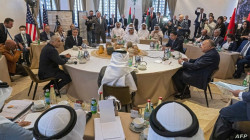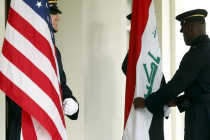Round four of talks in Oman: Will this be Iran's nuclear breakthrough?

Shafaq News/ The fourth round of indirect nuclear negotiations between Iran and the United States—originally scheduled for May 3 in Rome—has been rescheduled for Sunday, May 11, 2025, in Muscat, Oman.
While Omani officials cited “logistical reasons” for the change, Iranian sources described it as symptomatic of deeper strains, pointing to “conflicting positions” and Washington’s alleged attempts to revise parts of the agreed framework.
From Backchannel To Bargaining Table
Between February and April, three rounds of talks were held in Oman and Italy, moving from preliminary exchanges to more substantive discussions focused on nuclear-related issues. “The first round was just breaking the ice,” explained a European diplomat involved in the negotiations. “By the third, we began to see the outlines of a potential deal—provided both sides have the necessary political flexibility.”
Iranian negotiators described the progress as “cautious,” noting steps forward on verification mechanisms and the sequencing of sanctions relief. However, core disputes remain, particularly concerning Iran’s missile program and its broader regional posture.
Tehran has repeatedly maintained that such issues fall outside the scope of the current negotiations. “No sovereign nation negotiates its deterrence capabilities under duress,” stated Reza Talebnia, spokesperson for Iran’s Defense Ministry.
Reflecting on the third round, Foreign Minister Abbas Araghchi described the atmosphere as “more serious,” with the talks shifting toward technical discussions. “We are now transitioning from general topics to specialized issues,” he noted. Araghchi also confirmed that written proposals, inquiries, and responses had been exchanged multiple times, facilitated by Omani mediators.
Despite signs of momentum, the imposition of fresh US sanctions targeting Iran’s energy, shipping, and financial sectors has raised concerns in Tehran. Deputy Foreign Minister Ali Bagheri Kani cautioned that “unilateral sanctions in the middle of negotiations undermine trust and poison the atmosphere.”
Iranian officials continue to demand the full removal of sanctions imposed after 2021, along with formal recognition of Iran’s right to pursue peaceful nuclear development.
Potential Spoilers: What Could Derail The 4th Round?
Intensifying Regional Conflicts
Efforts to revive diplomatic relations are increasingly overshadowed by deepening regional instability, following a sharp escalation between Israel and Yemen’s Houthi movement.
Tensions intensified after a Badr-1P missile launched by the Houthis exploded near Ben Gurion Airport. The missile, equipped with a sophisticated guidance system, bypassed Israel’s Iron Dome and US Patriot defense systems stationed in the Negev. This marked the first time a Houthi projectile reached Israeli airspace since the start of the Gaza conflict in October 2023.
Over the past six months, the Houthis have claimed responsibility for over 70 missile and drone operations targeting Israel and maritime traffic in the Red Sea. The attacks have disrupted global shipping routes and driven a steep rise in maritime insurance costs, with Lloyd’s of London reporting a 450% surge in Red Sea risk premiums.
On the other hand, Israeli forces launched a series of airstrikes on Yemen. Six strikes hit port infrastructure and logistics facilities in Hodeidah, while additional strikes targeted areas around the capital, Sanaa.
The Yemeni Ministry of Health reported that the strikes killed 19 civilians, including three port workers, and caused severe damage to several buildings used by the World Food Programme for humanitarian deliveries.
Israeli officials described the air campaign as “pre-emptive.” National Security Adviser Tzachi Hanegbi characterized the strikes as “very powerful” and warned that further action would follow if threats from Yemen continued.
However, the Houthis pledged to escalate in response, threatening to impose a “total air embargo” on Israel while vowing continued attacks in retaliation for the war in Gaza.
Although a US-Houthi agreement brokered by Oman was reached to avoid targeting each other—including US naval vessels in the Red Sea and Bab al-Mandab Strait—the Houthis stated they would continue direct attacks on Israel. Tehran welcomed the deal and praised the Yemeni people's “legendary resistance,” further entrenching its alignment with the group and complicating US engagement.
Amid the growing tensions, former head of Iran's National Security and Foreign Policy Committee, Heshmatollah Falahatpisheh, suggested that the US de-escalation in Yemen reflects concerns over a broader conflict triggered by Israeli Prime Minister Benjamin Netanyahu.
In a statement to Shafaq News, Falahatpisheh confirmed that this shift in US policy could however, increase the likelihood of a nuclear agreement between Tehran and Washington.
A Shadow War Inside Iran
Iran has also been struck by a series of suspicious incidents, raising concerns about a covert sabotage campaign targeting the country's infrastructure.
The deadliest of these events occurred on April 28, when a massive explosion rocked the Shahid Rajaee Port in Bandar Abbas, Iran’s largest commercial port. The blast killed at least 62 workers and left more than 1000 injured.
In the wake of the explosion, Iranian officials quickly pointed to Israel, accusing the country of orchestrating “foreign-engineered attacks,” though they did not identify specific parties. Israel, adhering to its long-standing policy of ambiguity, neither confirmed nor denied involvement. Tensions, however, quickly escalated.
“The Zionist regime is playing with fire,” warned Brigadier General Abolfazl Shekarchi, senior spokesperson for Iran’s armed forces. “This port was a key artery for our economy,” he added,
This devastating incident was followed by a series of other unexplained events across Iran. A fire engulfed the Pars Motorbike Industrial Complex in Mashhad, destroying more than 4,000 square meters of production and storage space. Local emergency officials noted the presence of chemical accelerants—materials not typically found at the facility, raising suspicions of foul play.
A day later, a fire broke out at a cardboard recycling plant in Nazarabad, west of Karaj. Initially attributed to an electrical fault, the blaze is now under formal investigation, with authorities considering the possibility of sabotage.
These recent incidents fit into a troubling pattern that began in 2020, when a bomb, smuggled into Iran’s Natanz uranium enrichment facility disguised as construction material, caused severe damage.
The extent of the damage is becoming more apparent. In 2022, Iran recorded over 230 industrial fires and explosions, according to a report from the Iranian Parliament’s Research Center. While many of these incidents were attributed to poor safety standards, an increasing number have been labeled as “too coincidental” by analysts and former intelligence officers.
“It’s clear we’re witnessing a coordinated pressure campaign,” remarked the Iranian analyst Ariane Tabatabai in a post on X. “The goal isn’t just disruption, it’s to send a message to Tehran that it cannot negotiate from a position of impunity.”
Persian Gulf vs. Arabian Gulf
Negotiations could suffer yet another blow amid reports that President Donald Trump is weighing a controversial shift in terminology from “Persian Gulf” to “Arabian Gulf” in official US communications.
According to two senior American officials cited by the Associated Press, the White House is considering formalizing the term “Arabian Gulf” in upcoming statements during Trump’s scheduled visit to Saudi Arabia.
The change, still under review, would align the United States with language long promoted by Gulf Cooperation Council (GCC) states such as Saudi Arabia and the United Arab Emirates. If adopted, it would mark the first time an American administration officially endorses this alternative label.
The implications extend far beyond semantics. The name “Persian Gulf” remains the internationally recognized designation, enshrined in United Nations documentation, including UNGEGN Resolution 23 (2006), which upholds “Persian Gulf” as the sole official term.
Iran moved quickly to challenge the reported shift. Foreign Minister Abbas Araghchi responded by posting historical evidence on his official X account, including a 1945 US Navy map and a 1953 CIA document, both using the term “Persian Gulf.” His caption read, “You cannot erase history with a Sharpie.”
Public reaction inside Iran was swift and widespread. The hashtag #خلیج_فارس (Persian Gulf) surged across Persian-language social media platforms, garnering over 11 million mentions in under 48 hours.
Street protests erupted outside the Swiss Embassy in Tehran, which has represented US interests in Iran since 1979, where demonstrators carried placards declaring, “It’s Persian, Always Has Been.”
Reza Nasri, an international law expert based in France, described the controversy as deeply rooted in historical and national identity. “This goes far beyond language preferences. For Iranians, the name reflects centuries of cultural and territorial continuity. Challenging it is seen as an affront to sovereignty and heritage. Even reformists and conservatives, who rarely find common ground, stand united on this.”
What If Diplomacy Fails?
Just ahead of the fourth round of diplomatic talks, US President Donald Trump reignited tensions with Tehran during a televised statement, declaring he would “definitely” consider military strikes on Iran’s nuclear facilities if negotiations collapse. The remarks have sharpened divisions among policy experts, renewing concerns about the potential for conflict in the Middle East.
In an exclusive interview with Shafaq News, Ivan Sascha Sheehan, Associate Dean of the College of Public Affairs at the University of Baltimore, characterized Trump’s stance as “highly unpredictable,” while underscoring the seriousness behind the threat. “The president has declared that he would use decisive military force against the Islamic Republic, and I take him at his word.”
Sheehan projected that any future strike would depend heavily on airpower rather than the deployment of ground troops. He also pointed to the likelihood of parallel efforts involving ‘’Iran’s pro-democracy opposition’’ and covert operations within the country. “Iran has long feared internal dissent will metastasize to bring about regime change from within,” he explained, hinting that preparations for such a scenario could already be advancing, potentially timed for the summer.
Others take a more skeptical view. Samir al-Taqi of the Middle East Center in Washington dismissed the prospect of a military strike as both unlikely and potentially counterproductive. “What comes after? A strike won’t dismantle the program, it could legitimize it.”
He emphasized that Iran’s scientific base has become robust enough to render the nuclear program virtually irreversible, cautioning that any military escalation could speed up, rather than slow down, Iran’s nuclear progress. “Trump’s remarks are media posturing, not a serious strategic roadmap,” he noted in his comments to Shafaq News.
Bringing a broader regional lens to the issue, former Northwestern University professor Mohieddin Qassar told Shafaq News that neither the United States nor Israel appears ready to initiate or sustain a prolonged military campaign. “I don’t believe the Trump administration is in a position to open a new front in the Middle East, even a limited one.”
While acknowledging Israel’s capability to conduct precision airstrikes, Qassar pointed out that any such mission would still require coordination with Washington for intelligence gathering and logistical support. “And once the bombing ends, who controls the fallout?”
As the fourth round of indirect nuclear negotiations approaches, the path to progress is littered with landmines, both literal and figurative. From regional military flare-ups to covert sabotage and symbolic affronts, the climate surrounding the Muscat talks has grown increasingly volatile.
While both Tehran and Washington insist that diplomacy remains the preferred path, the accumulation of stressors may outweigh technical compromises made at the table. If the Oman round is to yield a breakthrough, it will require not only negotiation but restraint, clarity of purpose, and a willingness to disentangle diplomacy from domestic and geopolitical theater. Otherwise, Muscat may be remembered not for progress, but for missed opportunity.





